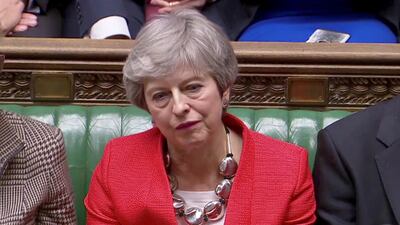Britain said on Wednesday it would eliminate import tariffs on a wide range of goods and avoid a so-called hard border between Ireland and Northern Ireland in the event of a no-deal Brexit.
The government announced the measures, which it said would be temporary, ahead of a vote by policymakers later on Wednesday to decide whether Britain should leave the European Union without a deal, a prospect that alarms many employers with the scheduled March 29 Brexit date fast approaching, according to Reuters.
Prime Minister Theresa May suffered a second, heavy parliamentary defeat on the withdrawal deal she struck with the EU on Tuesday, leaving open the possibility of an abrupt, economically damaging Brexit without a transition arrangement.
However, policymakers are expected to vote against a no-deal Brexit and then, on Thursday, vote in favour of seeking a delay to Brexit.
Under the Temporary Tariff Regime, a no-deal Brexit that would last for up to 12 months, 87 per cent of total imports to the United Kingdom by value would be eligible for tariff-free access, up from 80 per cent, Bloomberg said.
The new system would mean 82 per cent of imports from the EU would be tariff-free, down from the current 100 per cent, while 92 per cent of imports from the rest of the world would pay no duties at the border, up from 56 per cent.
Some protections for British producers would remain in place, including for the country's car makers and beef, lamb, pork, poultry and dairy farmers.
The UK will also retain existing tariffs in areas including fuel and ceramics as a protection against “unfair global trading practices”, such as dumping.
“This is no way to run a country,” Carolyn Fairbairn, director general of the Confederation of British Industry, told the BBC. “What we are potentially going to see is this imposition of new terms of trade at the same time as business is blocked out of its closest trading partner. This is a sledgehammer for our economy.”
Cutting tariffs on imported goods would ease the blow to British consumers from an expected jump in inflation in the event of a no-deal Brexit, which would probably cause sterling to tumble and make imports more expensive.
It would also expose many manufacturers to cheaper competition from abroad and, if maintained, low or zero tariffs would deprive Britain of ammunition for extracting concessions from other countries in future trade talks.
On the Irish border, the British government said it would not introduce any new checks or controls on goods moving from the Irish Republic to the British province of Northern Ireland in the event of a no-deal Brexit, stressing the plan was temporary and unilateral.
"The measures announced today recognise the unique circumstances of Northern Ireland," Karen Bradley, Britain's secretary of state for Northern Ireland said. "These arrangements can only be temporary and short-term."
Britain would seek to enter discussions urgently with the European Commission and the Irish government to agree long-term measures to avoid a hard border.
Goods crossing the border from Ireland into Northern Ireland would not be covered by the new import tariff regime.
Britain, Ireland and the EU have said they want to avoid physical checks on the border, which was marked by military checkpoints before a 1998 peace deal ended three decades of violence in the region. But they disagree on the "backstop", or insurance mechanism, to exclude such border checks.

